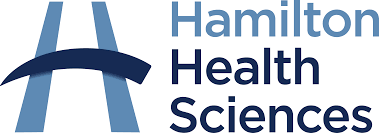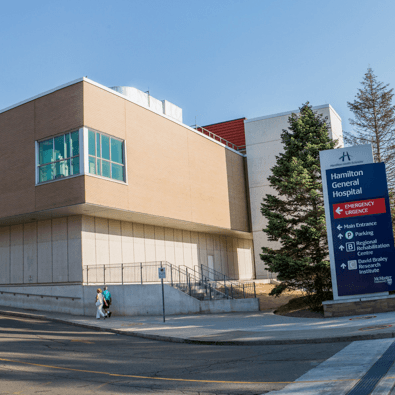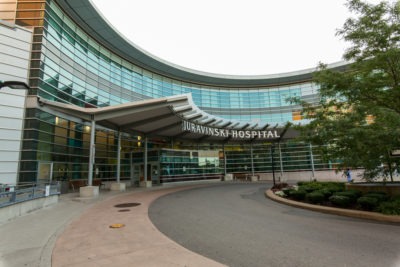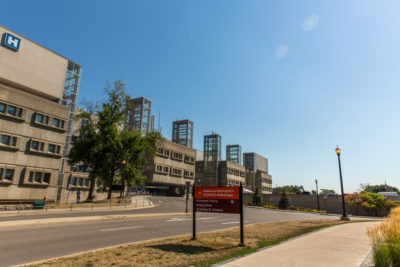On our medical diagnostic units, specially-trained staff perform a variety of tests to help diagnose certain cardiac, pulmonary and neurological medical conditions. The MDU at HHS provides services at Hamilton General Hospital (HGH), Juravinski Hospital (JH), McMaster University Medical Centre (MUMC) as well as West Lincoln Memorial Hospital (WLMH). Scroll down to learn more about MDU services across our sites.
ECG (Electrocardiogram)
Electrocardiogram testing is available at HGH, JH, MUMC and WLMH.
An electrocardiogram (ECG or EKG) is a medical test that records the electrical activity of the heart. It measures the heart’s rhythm and can help diagnose heart conditions or abnormalities. The test is non-invasive and involves placing electrodes on the skin to capture the heart’s electrical signals.
- You will need to remove your clothes from the waist up to allow for electrode placement
- A towel will be used for privacy
- You may need to be shaved in areas of electrode placement to ensure an accurate test
The test usually takes about 20 minutes
Echo (Echocardiogram)
Echocardiogram testing is available HGH, JH, MUMC and WLMH (adult).
For pediatric echo, please click here.
An echocardiogram is a medical test that uses sound waves to create detailed images of the heart’s structure and function. It helps doctors evaluate the heart’s chambers, valves, and overall pumping efficiency. This non-invasive procedure is useful for diagnosing various heart conditions and assessing treatment effectiveness.
- Bring a list of current medications; continue on your medications unless instructed otherwise by your physician.
- Bring a valid health card as required by the Ministry of Health.
- You will need to remove your clothes from the waist up for scanning
- A towel or gown will be used for privacy
The test usually takes about 60 minutes.
Exercise Testing
Exercise Testing is available at HGH, JH, MUMC and WLMH.
A graded exercise test, also known as an exercise stress test, is a diagnostic test used to evaluate the heart’s response to physical activity. During the test, the patient walks on a treadmill or pedals a stationary bike while heart rate, blood pressure, and ECG readings are monitored. It helps detect coronary artery disease, assess exercise tolerance, and evaluate the effectiveness of heart treatments.
- Please bring a valid health card as required by the Ministry of Health.
- Bring a list of current medications; continue on your medications unless instructed otherwise by your physician
- Please bring reading glasses, if required, to read and sign the consent form.
- No lotion or powder on the skin from the waist up on the day of the test.
- Please wear or bring clothing appropriate for exercising (t-shirt), including shoes that you can walk/run or bike in
- Eat lightly the day of the test. Do not eat a heavy meal 2 hours before the test
o Try to avoid caffeine on the day of the test
o Continue taking medications unless otherwise instructed by your physician
o Do not skip meals if you are diabetic - Do not smoke or vape on the day of the test
- Your appointment may take 45 to 60 minutes
An enhanced cardiopulmonary exercise test is an advanced diagnostic tool that combines traditional exercise stress testing with comprehensive measurements of cardiopulmonary function. It assesses not only cardiovascular parameters like heart rate, blood pressure, and ECG readings during exercise but also evaluates respiratory parameters such as oxygen uptake, carbon dioxide production, and ventilatory response. This test provides a detailed assessment of overall cardiopulmonary fitness and can help diagnose and manage various cardiac and respiratory conditions, as well as evaluate exercise tolerance and treatment effectiveness.
Pulmonary Function Testing
Pulmonary Function Testing is available at HGH, JH, MUMC and WLMH.
Pulmonary function testing is a group of tests that measure how well the lungs are functioning. These tests assess lung volume, capacity, and gas exchange to diagnose conditions like asthma, chronic obstructive pulmonary disease (COPD), and other respiratory disorders. PFTs are non-invasive and typically involve breathing into a specialized machine to measure various lung parameters.
- If you are having trouble breathing, use your bronchodilator inhaler(s) and let the Respiratory Therapist know at the time of your appointment. If you are under the care of a Respirologist, only stop using puffers if ordered to do so by the Respirologist.
- Please bring a list of your puffer(s)/inhaler(s) with you.
- Bring a valid health card as required by the Ministry of Health.
Neurology Testing (EEG and EMG)
EEG and EMG testing is available at HGH, JH and MUMC (MUMC is Adult and Pediatric).
An EEG (electroencephalogram) is a test that measures and records the electrical activity of the brain. It’s used to diagnose conditions like epilepsy, sleep disorders, and other neurological conditions by detecting abnormal brain wave patterns.
- Bring a list of current medications; continue on your medications unless instructed otherwise by your physician.
- Have clean/dry hair with no added hair products. Please remove all weaves/extensions.
- Bring a valid health card as required by the Ministry of Health.
EMG (electromyogram) testing measures the electrical activity of muscles. It helps diagnose muscle disorders, nerve damage, and conditions like carpal tunnel syndrome by evaluating the muscle’s response to nerve stimulation.
Where to Find Us
Juravinski Hospital
- Enter the hospital through the main entrance on Concession Street.
- Upon entry, turn right.
- The MDU is located on the left side beside the lobby and glass-walled waiting room:
- For appointments scheduled on weekends or statutory holidays;
- Please proceed to Diagnostic Imaging Reception for registration (after entering the main entrance, turn right and proceed down the corridor following signs for Diagnostic Imaging).
- After you are registered, you will return to the MDU which will be adjacent to the lobby beside the glass-walled waiting room.
- For appointments scheduled on weekends or statutory holidays;
Hamilton General Hospital
- From the main entrance on Barton Street, turn left at the coffee shop and continue to the corridor.
- Turn left at the Red Wall (Section W).
- The MDU entrance is well marked and is the third door on the right.
- For appointments scheduled on weekends or statutory holidays;
- Please proceed to Diagnostic Imaging Reception for registration (continue down the corridor passed MDU following signs for Diagnostic Imaging).
- After you are registered, you will return to the MDU.
- For appointments scheduled on weekends or statutory holidays;
McMaster University Medical Centre
- From the main entrance, turn right and enter the yellow section.
- Take the yellow elevators to level 3 and turn right.
- Continue passed the corridor and outdoor play area.
- The MDU is well-marked and located on the right hand side of the corridor, 3U
4U Neurology & Neurodiagnostics, McMaster University Medical Centre:
- From the main entrance, turn right and enter the yellow section.
- Take the yellow elevators to level 4 and turn right.
- Continue pass the corridor.
- Neuorology and Neurodiagnostics is well-marked and located on the right hand side of the corridor, 4U
A parent/guardian must be present at all pediatric clinical visits and telephone calls at McMaster University Medical Centre.
West Lincoln Memorial Hospital
- From the main entrance proceed to your right, down the main hallway.
- Take the elevator on the left down to the basement.
- Turn right, then left, continue down the hall and check in at the MDU office.
Contact Us
For booking inquiries or to reschedule your appointment at HGH, JH or MUMC sites, please call 905-521-2100, x41484.
For booking inquires at WLMH, please call 905-521-2100 x 11253
For Physicians: Please fax your completed requisition to one of the following sites:
Hamilton General Hospital
Fax: 905-527-4861
Juravinski Hospital
Fax: 905-575-2560
McMaster University Medical Centre
Fax: 905-521-2635
West Lincoln Memorial Hospital
Fax: 905-945-5148




